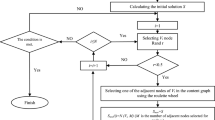Abstract
This paper suggests an evolutionary approach to design coordination strategies for multiagent systems. Emphasis is given to auction protocols since they are of utmost importance in many real world applications such as power markets. Power markets are one of the most relevant instances of multiagent systems and finding a profitable bidding strategy is a key issue to preserve system functioning and improve social welfare. Bidding strategies are modeled as fuzzy rule-based systems due to their modeling power, transparency, and ability to naturally handle imprecision in input data, an essential ingredient to a multiagent system act efficiently in practice. Specific genetic operators are suggested in this paper. Evolution of bidding strategies uncovers unknown and unexpected agent behaviors and allows a richer analysis of auction mechanisms and their role as a coordination protocol. Simulation experiments with a typical power market using actual thermal plants data show that the evolutionary, genetic-based design approach evolves strategies that enhance agents profitability when compared with the marginal cost-based strategies commonly adopted
Similar content being viewed by others
References
Bagnall AJ. (2000). A multi-adaptive agent model of generator bidding in the UK market in electricity. In: Genetic and evolutionary computation conference GECCO 2000, Morgan Kaufmann, pp 605–612
Contreras J., Candiles O., de la Fuente JI., Gómez T. (2001). Auction design in day-ahead electricity markets. IEEE Trans Power Syst 16(3):409–417
Cordon O., Herrera F., Gomide F., Hoffmann F., Magdalena L. (2001). Ten years of genetic fuzzy systems: current framework and new trends. In: Proceedings of 9th joint IFSA world congress and 20th NAFIPS international conference 3:1241–1246
Cordón O., Herrera F., Hoffman F., Magdalena L. (2001). Genetic fuzzy systems: evolutionary tuning and learning of fuzzy knowledge bases. In: Advances in fuzzy systems: applications and theory, vol 19. World Scientific, Singapore
Cordón O., Herrera F., Magdalena L., Villar P. (2001). A genetic learning process for scaling the factors, granularity and contexts of the fuzzy rule-based system data base. Info Sci 136:85–107
Cordón O., Herrera F., Villar P. (2001) Generating the knowledge base of a fuzzy rule-based system by the genetic learning of the data base. IEEE Trans Fuzzy Syst 9(4):667–674
David AK., Wen FS. (2000). Strategic bidding in competitive electricity markets: a literature survey. In: Proceedings of the IEEE PES 2000 summer power meeting, vol 4. IEEE Power Engineering Society, IEEE, pp 2168–2173
El-Hawary ME., Christensen GS. (1979). Optimal economic operation of electric power systems. In: Mathematics in science and engineering, vol 142. Academic, New York
Glorennec P. (1996). Constrained optimization of FIS using an evolutionary method. In: Herrera F., Verdegay JL (eds). Genetic algorithms and soft computing, studies in fuzziness and soft computing, vol 8. Physica-Verlag, Wurzburg, pp. 349–368
Green R. (2000). Competition in generation: the economic foundations. Proc IEEE 88(2):128–139
Herrera F., Lozano M., Verdegay JL. (1997). Fuzzy connectives based crossover operators to model genetic algorithms population diversity. Fuzzy Sets Syst 92(1):21–30
Michalewicz Z. (1996). Genetic algorithms + data structures = evolution programs. Springer-Verlag, Vienna
Monclar F-R., Quatrain R. (2001). Simulation of electricity markets: a multi-agent approach. In: International conference on intelligent system application to power systems. IEEE Power Engineering Society, Budapest, pp. 207–212
Niimura T., Nakashima T. (2001). Deregulated electricity market data representation by fuzzy regression models. Syst Man Cybern C Appl Rev IEEE Trans 31(3):320–326
Operador Nacional do Sistema, Brazilian ISO web site. http://www.ons.org.br (2002)
Pedrycz W., Gomide F. (1998). An Introduction to fuzzy sets: analysis and design. MIT, Cambridge
Richter CW., Sheblé GB. (1997). Building fuzzy bidding strategies for the competitive generator. In: Proceedings of the North American power symposium, Laramie, Wyoming, USA http://www.dakotarichter.com/papers/NAPS97/FUZSTRAT.html
Richter CW. Jr., Sheblé GB. (1998). Genetic algorithm evolution of utility bidding strategies for the competitive marketplace. IEEE Trans Power Syst 13(1):256–261
Richter CW. Jr., Sheblé GB., Ashlock D. (1999). Comprehensive bidding strategies with genetic programming/finite state automata. IEEE Trans Power Syst 14(4):1207–1212
Sandholm TW. (1999). Distributed rational decision making. In: Weiss G (eds). Multiaget systems: a modern approach to distributed artificial intelligence, chap 5. MIT, Cambridge
Sheblé GB. (1998). Agent based economics. In: Ilic M., Galiana F., Fink L (eds). Power systems restructuring: engineering and economics, chap 6. Kluwer, Dordrecht, pp. 231–235
Sheblé GB. (1999). Computational auction mechanisms for restructured power industry operation. Kluwer, Dordrecht, pp. 240–246
Smith RG. (1980). The contract net protocol: high-level communication and control in a distributed problem solver. IEEE Trans Comput 29(12):1104–1113
Visudhipan P., Ilic M. (1999). Dynamic games-based modeling of electricity markets. In: Proceedings of the 1999 IEEE power engineering society winter meeting, vol 1. IEEE, New York, pp. 274–281
Walter I., Gomide F. (2003). Evolving fuzzy bidding strategies in competitive electricity markets. In: IEEE international conference on systems, man and cybernetics SMC 2003, vol 4. IEEE, Washington,pp. 3976–3981
Walter I., Gomide F. (2003). Genetic fuzzy systems to evolve coordination strategies in competitive distributed systems. In: Third EUSFLAT international conference in fuzzy logic and technology. Zittau, Germany, pp. 114–119
Widjaja M., Sugianto LF., Morrison RE. (2001). Fuzzy model of generator bidding system in competitive electricity markets. In: Proceedings of the 10th IEEE international conference on fuzzy systems, vol 3. IEEE,Melbourne, pp. 1396–1399
Xiong G., Hashiyama T., Okuma S. (2002). An evolutionary computation for supplier bidding strategy in electricity auction market. In: Proceedings of the IEEE power engineering society transmission and distribution conference, vol 1. IEEE, pp 83–88
Author information
Authors and Affiliations
Corresponding author
Rights and permissions
About this article
Cite this article
Walter, I., Gomide, F. Design of coordination strategies in multiagent systems via genetic fuzzy systems. Soft Comput 10, 903–915 (2006). https://doi.org/10.1007/s00500-005-0016-8
Published:
Issue Date:
DOI: https://doi.org/10.1007/s00500-005-0016-8




